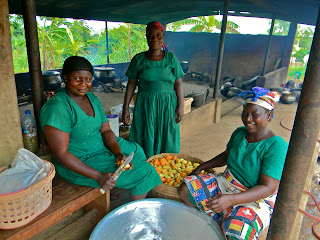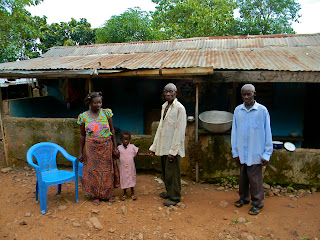By Cassie Bingham A comprehensive blog of my experience preparing for and conducting a 3 month field research project in Ghana, Africa. Here I will document my insights, notes, literary sources and more. The blog title is one of my favorite Passion Pit lyrics, and a good piece of advice for all inhabitants of the world! Please see my Project Proposal page for an overview of my project and proposed ethnographic field work.
Tuesday, May 29, 2012
Random Journal Posts #2
Tuesday, May 22, 2012
An A-Cultural God
Random Journal Post #1
Tuesday, May 15, 2012
Finding my Footing, and Musings about the Variations of Man
PS: I will start posting a few photos, and selected parts of my journal entries each Tuesday, as well as insight posts like these, so watch out for those!
Thursday, May 3, 2012
First Impressions
Sunday, April 15, 2012
Fighting Fears
Friday, April 6, 2012
Medicine
Coming of Age
Zion in All Corners of the Earth
Tuesday, March 27, 2012
Jihad vs McWorld
I had to do a book review of the book "Jihad vs McWorld" for one of my sociology classes. In it the author argues that the duel spread of globalism and technological uniformity (McWorld) and tribal separations and hostility based on religion, ethnicity, race, etc (Jihad) combats democracy and is a threat to the sovereign national state. Barber begins by defining globalism by giving a myriad of examples of capitalism and technology that have become uniform nearly worldwide. This includes the trade of natural resources, the global advertising of companies such as Coca Cola, and the international television broadcasting of American based media such as MTV music videos. He then goes on to discuss what he calls Jihad, the boundaries and separations caused by international tribalism. He draws examples from places like Islam, China, Russia, and the Pacific Rim. Throughout, Barber emphasizes that McWorld and Jihad are inevitably linked and dependent, globalism spawning from colonialism, and tribalism the backlash of the same. Both McWorld and Jihad threaten democracy, the former making nations dependent and weakening their sovereign power, and the latter splintering nations into sects, which then become more dependent on McWorld.
The book made me recall a conflict I have thought about before: the beauty of diversity vs the hatred and resentment it seems to cultivate. Often, I have felt extremely depressed about the seemingly natural proneness humans have towards ostracizing those different from the majority, and assuming that the way they live/look is by default the "correct" way of living/looking. This has led to inconceivable amounts of sadness and suffering throughout the world in all areas - physical, mental, emotional, spiritual. However, some of the moments in my life when I have felt the most exhilarated have been the times when I was experiencing new culture, different from my own. The beauty behind the variations in human existence is mind-boggling, and provides for an inexhaustible way of looking at things and behaving. So, what would be better? Living in one giant, homogenous world to prevent against the pains of negative group mentalities that foster ethnocentrism, tribalism, racism, etc? Or continuing to encourage diversity and cultural differences because of the massive benefits they bring to humanity?
In my opinion, although the world is far from ideal, diversity is worth it. I am so excited to visit Ghana because I feel I can learn so much from a new experience of place, time, behavior, materialism, etc. New doors will be opened in my mind that would have remained locked while remaining only under the American ontology. Cultural exposure opens up new spiritual, psychological, and even physical routes. I think it is one of the most significant and effective ways of gaining an education.
































